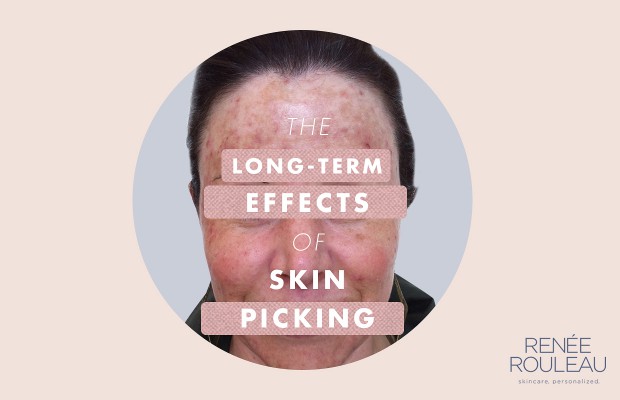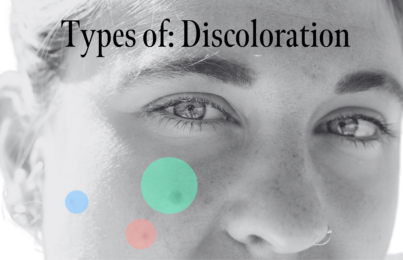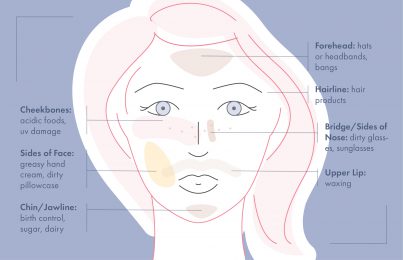Every expert will tell you that picking at your skin is a habit that you should stop, yet most people don’t necessarily see the harm in it. Well, I can assure you that damage is occurring and for some, it can show up later in life in a very visible way.
Confessions of a skin picker
I am a recovered skin picker, so I am very compassionate to those who struggle with this. I have dealt with my own acne, particularly adult hormonal cystic acne, and couldn’t keep my hands off of my face. It’s actually why I became an esthetician. When I found out there was a profession where I could get paid to pick at people’s skin, I knew I had found my calling! No worries, I was a responsible picker with other’s skin but not with my own, sadly. I finally realized that messing with cystic acne was a no-win situation and gave up my bad habit.
There are four types of skin pickers:
Mild picker:
You pick at your skin only when there is a blemish that may need attention. When there are no blemishes, you keep your hands off of your face.
Moderate picker:
You pick at your skin when you feel anything that is raised from the skin’s surface or anything with a rough texture. (This includes scratching at flaky skin.)
Advanced picker:
You pick at your skin over and over again, even when nothing is present. Your fingers are frequently on your face searching for something to scratch, pick at and mess with. You pick so aggressively to the point of make your skin bleed and scab.
Severe picker:
“There are four types of skin pickers: mild, moderate, advanced and severe pickers.”
Your fingers are constantly on your face scratching, picking and messing with anything and everything—even healthy skin. You pick at scabs and never give them the chance to heal. You have no control. Your skin picking causes a lot of emotional distress and problems with work, social or other daily activities. You may have a condition called Dermatillomania, which is classified as an impulse control disorder. You should seek help with a counselor or medical professional for treatment options.
The later-in-life effects of picking at your skin
When I see someone who has been a chronic skin picker for years, it’s so obvious to me. Case in point, my client in the picture above who I’ll call Eve. She first came to me with visible scabs on her forehead, cheeks and chin, along with deeply pigmented, spotty and uneven-looking skin. That combination made it obvious to me what had happened, and after a thorough consultation, my assumptions were correct. Eve had acne in her younger years which triggered the desire and need to pick at her blemishes. As she got into her 30s, her breakouts were few and far between, but her picking habit had stuck. In her 40s, when pigment cells rise to the surface, the trauma and subsequent damage from messing with her skin started showing up in the form of discoloration.
Three common causes of skin discoloration:
Skin discoloration from acne
If you’re someone who gets, or has gotten, blemishes, you’re all too familiar with the red and dark mark it leaves behind—even if you never squeezed it. This is caused by melanin cells triggering an inflammation response indicating an injury (an infection) in the skin. However, if you happen to pick at it, the bleeding and scabbing will result in a longer-lasting dark scar. Eventually, the pigment cells will settle down especially when expedited by a fading product like Post-Breakout Fading Gel. When left on its own, a scar can take 1-4 months to disappear. This is called post-inflammatory hyperpigmentation and is all too common whenever a blemish appears. Read how to fade your acne scars fast.
Skin discoloration from aging
As part of the natural aging process for all skin types (even for those who never had acne), pigment cells from past sun damage will rise to the surface and can show in the form of brown spots starting in your 30s. Your skin’s genetic makeup (not necessarily how much sun damage you have had) will determine how much of it will visibly show. Example: Those prone to freckles have far more active melanin cells in their skin and will naturally develop more visible hyperpigmentation.
Skin discoloration from acne, picking + aging
“For those who have caused constant trauma to their skin due to chronic picking, they can have increased melanin activity that looks very spotty.”
For those who have caused constant trauma to their skin due to chronic picking, they can have increased melanin activity that looks very spotty. This was evident with my client, Eve. I have seen so many people like this through the years, and they never even realize that it’s from picking at their skin. How do you get rid of it? The same way you get rid of any discoloration. Read how to get rid of brown spots.
How to stop picking at your skin
You must first have the desire to get better. For me, I gave it up as a New Year’s resolution. I was ruining my skin by picking at my cysts, so I finally had enough and stopped. (Of course, using a topical treatment for cystic acne helped prevent them in the first place so I was less likely to pick.)
- Sign a no picking skin contract
- Keep your hands busy with a no picking twisty toy
- Read these other tips to stop skin picking
For some people, it’s just not that easy. I gently addressed the skin picking with Eve, and she was fully aware of what she was doing to her face. However, giving up skin picking proved to be challenging. I did a few skin peels to help fade the discoloration, and while we did get nice improvement, her continuous picking was working against the goals we were trying to achieve for her skin.
I am fully empathetic to skin pickers, as I have been in those shoes. My intention of this post is to create an awareness for this condition and share an unintended result that might show up years later.
Celebrity Esthetician & Skincare Expert
As an esthetician trained in cosmetic chemistry, Renée Rouleau has spent 30 years researching skin, educating her audience, and building an award-winning line of products. Her hands-on experience as an esthetician and trusted skin care expert has created a real-world solution — products that are formulated for nine different types of skin so your face will get exactly what it needs to look and feel its best. Trusted by celebrities, editors, bloggers, and skincare obsessives around the globe, her vast real-world knowledge and constant research are why Marie Claire calls her “the most passionate skin practitioner we know.”






Comments:
I am 52 yrs old my skin picking has created monstrous results from my younger years of picking. My trauma results from ingrown hair follicles that I can not to this day stop dismantling. They hurt they always are inflamed and become big and I can NOT leave it alone until I am able to release the hair(s) by then I’ve done substantial damage to my skin. Again I’m 52 is there a way to reduce the damage I’ve done to my skin and how do I keep from getting reaccuring ingrown hairs without having a beard? Lol seriously tho.
Posted By: Yvonne |
I would suggest talking to someone about laser hair removal. You may or may not be a candidate but it would resolve the main concern if you can!
Posted By: Renée Rouleau |
Please accept my apologies for my previous comment. I came via a Sun article ( https://www.thesun.co.uk/fabulous/8613159/horrifying-photo-long-term-damage-picking-spots-discolouration-scarring/ ) about your blog post which – unsurprisingly – did a complete hatchet job of your post and did not mention compulsive skin picking at all. When I came to your blog post and quickly skimmed over it I missed the fact that you DO in fact talk about dermatillomania and do urge people to seek professional help.
As you may have gathered from my initial comment this is a topic very dear to my heart. I spent all of my teenage years and quite a lot of my 20s being told it was just a bad habit, that I needed to just stop doing it before I did a random google search and found out that it wasn’t a bad habit. I now do everything I can do spread awareness so to find that the Sun purposefully left out that important information so that they could create a more sensationalised piece angers me to no end. You can also imagine how stupid I felt when I realised that you had actually done exactly what I’d accused you of not doing.
So please accept my humble apologies and my thanks for doing what you have done here.
Posted By: Heather |
Hi Heather! No need to apologize, I know this is an issue close to many people’s hearts. Thank you for spreading awareness and using your experience to help others <3
Posted By: Renée Rouleau |
A skincare expert who doesn’t recognise when someone comes to them and is suffering from the mental illness known as Dermatillomania aka compulsive skin picking is pretty worrying. While I wouldn’t expect you to be an expert in mental health you should at least be familiar with the signs and not be telling people that this is just a bad habit that they can stop any time they wish.This attitude just causes more people to go undiagnosed and not receive the help they really need.
Posted By: Heather |